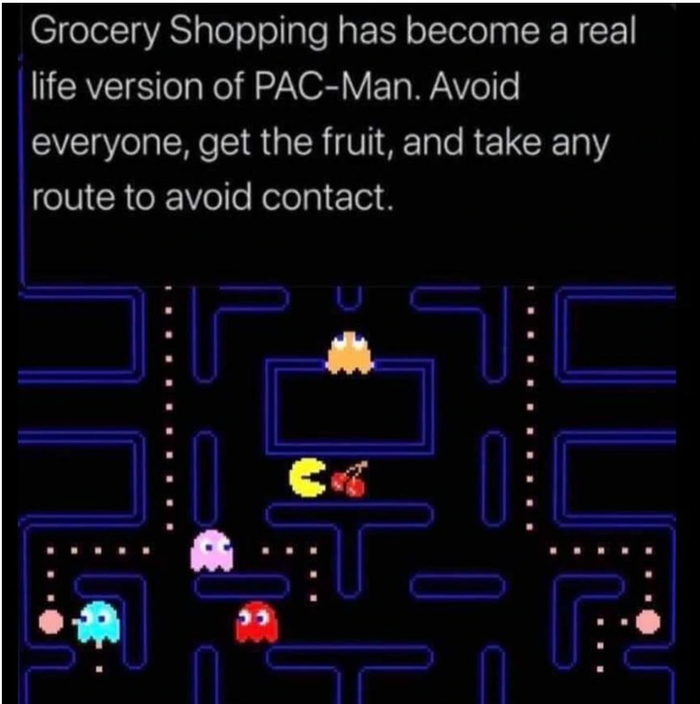Life is returning to American streets and shopping districts, but with consumers cautious and manufacturers layering sanitization procedures on top of worker safety protocols, the return to "normal" could be a long trip.

Natural Products Industry Health Monitor, May 22, 2020
A global lockdown might make weeks feel like months and months weigh like centuries, but business allows little room for ennui. As distracting as the daily inundation of the negative can be, the time to look forward is always now. In this new weekly feature, Informa Health and Nutrition sister properties provide that right-now-right-here update. Look for the Industry Health Monitor each Friday to learn the major news that is affecting the natural products market immediately and the less obvious insights that could dictate where the market may struggle or thrive in the months to come.
Consider this: Non-essential activity returns with some trepidation
Spring came late to 2020. Sure, the buds opened their leaves to the sun, the birds sang at a different pitch, the goslings waddled and the sunsets lingered long into evening. But it didn't feel the same.
Now, however, a new kind of spring has arrived: malls are opening their doors and shoppers are beginning to trade their weekly face-masked dash to the grocery store for the first hints of “non-essential” shopping—something we used to call “browsing.”
What this means for natural product retailers has yet to reveal itself. But for natural product manufacturers, coming back to life means following the 60 pages of procedures that were quietly released this week by the Centers for Disease Control to replace the improvised cautions in effect since March.
None of this will happen all at once. What some might think of as an on/off switch is turning into more of a gradual dimmer for most jurisdictions, nearly all companies and all but a very few gun-toting and flag-waving protesters. That desperation for mall walking and haircuts has cut support for stay-at-home orders from the April consensus, but 69% of Americans still favor restricting gatherings to 10 or fewer people.
New Hope Network NEXT Data and Insights polling adds some granularity that could be telling for the natural products industry. “Non-essential shopping” stands out here:
That only 29% of consumers are ready to return to restaurants is important not only for restaurant owners—many of whom are calculating when it will make economic sense to open dining rooms at 50% capacity—but also natural product retailers that are serving a nation still cooking more meals at home, as well as natural product and supplement brands that can expect the unprecedented spike in e-commerce sales to continue.
But not all commerce happens in the checkout aisle. Behind the scenes, manufactures have struggled to keep their workers safe. It’s not just meat packing plants and Amazon distribution centers that have been impacted. In an interview with Nutrition Business Journal, NOW Foods CEO Jim Emme says that sanitization procedures have been strictly followed, to the point where production was halted at four different facilities when workers were diagnosed with Covid-19. "We leave them closed for 24 hours," Emme said.
Many manufacturers are segregating their workers into staggered shifts—with sanitization procedures in between—to limit contact, while office staff are largely working from home. Offices at New Hope Network will not open until late June, at the earliest, and businesses everywhere are still digesting the new CDC guidance that was released on May 20.
Know this: Brands should be aware of changing investment models
With boardrooms transported to the Zoomverse, mergers and acquisitions in the natural products industry appear to be hovering over the pause button, but funding and investments are doing well, reaching a high point for the year in early May. Note here that the money isn’t flooding into consumer packaged goods—that’s down—but instead into ag tech and infrastructure that boosts supply chain efficiency, attracting attention and dollars as investors look at technology and practices that adapt to a new supply chain model. That means brands need to adapt, too, and know where to find investors.
The Nutrition Capital Network tracks financial activity in the natural products industry. Investment activity experienced a significant lull in March, but has found traction again with new investments occurring through April and May on par with 2019 activity. Behind the scenes, mergers and acquisitions are down slightly, while there is more activity in terms of financings and investments. Mergers and acquisitions tend to be a longer process and one that is harder to facilitate.
They are also not as amenable to virtual transactions as financings. Investment in branded consumer packaged goods companies is also down. Globally monitored investments are showing interest in the delivery space, ag tech efforts on infrastructure issues to improve supply chain efficiency (reduce waste, improve yields, etc.) and plant-centric innovation.
Natural Products Industry Health Monitor indexes
Consumer behavior indexes measure consumer behaviors through weekly surveys that are compared to a 2017 benchmark before COVID-19 emerged to see how the novel coronavirus is changing consumers. With almost two months of tracking since the outbreak of COVID-19 in the United States, consumers have not abandoned their behaviors core to the natural products industry. Behaviors seeking environmentally and responsibly made products, high quality ingredients, nutrient density and transparency remain.
Natural products industry engagement index tracks social and mass media engagement of the top 50 trends defining the natural products industry. The index tracks weekly keyword engagement of these top trends that are compared to a Q4 2019 weekly average benchmark before COVID-19 emerged. This enables the reader to see how the novel coronavirus is changing consumer engagement with the top natural products industry trends tracked by New Hope Network. With two months of tracking since the outbreak of COVID-19 in the United States, engagement spikes and dips as we navigate this period of unrest but remains in alignment with 2019 stats.
Listen to this: CEO talks slow road to normal
Deerland Probiotics and Enzymes CEO Scott Ravech is getting his company back up to speed, but doing so despite highly publicized missteps by state leaders in reopening Georgia, where Deerland has facilities. Ravech calls the state government's reopening plans “an embarrassment” in this story on how supplement companies are edging back to full operations.
The Washington Post says the COVID-19 pandemic is “changing every aspect of shopping.” The malls may be open, but that too-perky staffer at the Apple store is now taking your temperature before she shows you the latest iPad.
Enjoy this
The new era of grocery shopping will be familiar to anybody who played video games in the 80s.

Methodology footnotes
Natural products consumer behavior indexes: New Hope Network NEXT Data and Insights survey of n~1,000 collected weekly since March 30, 2020, using a convenience sample directionally representative of U.S. consumers ages 18-65 weighted for age, region and gender. The 2017 survey data are based on responses of 1,000 people nationally representative of the U.S. adult population. Index tracks “top two box” responses.
Natural products industry engagement index: New Hope Network NEXT Data and Insights tracks the core 50 trends defining and innovating the natural products industry. By filtering social and mass media listening through these top trends we are able to track weekly indexes of total mentions and Net sentiment of the hot topics representative of the industry from the beginning of March 2020 compared to average weekly scores of the last three months of 2019. This allows stakeholders a view into the pulse of the industry through online conversations.
Natural products industry investment index: Nutrition Capital Network, part of Informa’s Health and Nutrition portfolio of brands, collects all investment transactions occurring in the natural products industry. Total number of investment transactions (mergers, acquisitions, financings) are tallied weekly and compared to a fourth quarter 2019 weekly average benchmark before COVID-19 emerged.
About the Author(s)
You May Also Like




